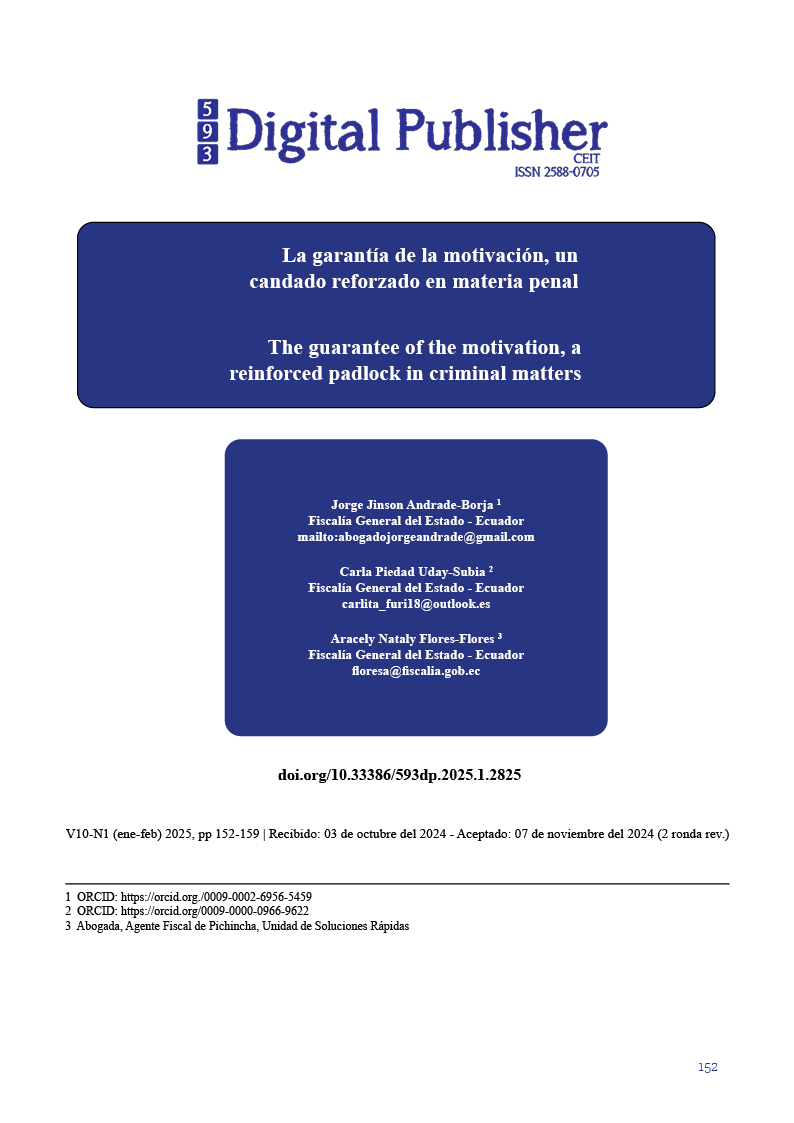The guarantee of the motivation, a reinforced padlock in criminal matters
Main Article Content
Abstract
Motivation is a fundamental right of all citizens that, when activating effective judicial protection, must be guaranteed; In the criminal sphere, due to the current pronouncements of the Constitutional Court of Ecuador regarding motivation, this has taken an opportune turn by creating a reinforced padlock to protect the defendants. Therefore, the objective of this work will be to define what the additional standards of motivation in criminal matters that the Constitutional Court has created consist of. A task that, without a doubt, will contribute to an appropriate administration of justice and will help to identify the errors that judges make when pronouncing a sentence of conviction. For this purpose, the method to be used will be analytical since an analysis of the rulings of the Constitutional Court will be carried out. At the end of our work we will conclude that the new motivation standards provide reinforced guarantees to the defendants.
Downloads
Article Details

This work is licensed under a Creative Commons Attribution-NonCommercial-ShareAlike 4.0 International License.
1. Derechos de autor
Las obras que se publican en 593 Digital Publisher CEIT están sujetas a los siguientes términos:
1.1. 593 Digital Publisher CEIT, conserva los derechos patrimoniales (copyright) de las obras publicadas, favorece y permite la reutilización de las mismas bajo la licencia Licencia Creative Commons 4.0 de Reconocimiento-NoComercial-CompartirIgual 4.0, por lo cual se pueden copiar, usar, difundir, transmitir y exponer públicamente, siempre que:
1.1.a. Se cite la autoría y fuente original de su publicación (revista, editorial, URL).
1.1.b. No se usen para fines comerciales u onerosos.
1.1.c. Se mencione la existencia y especificaciones de esta licencia de uso.
References
Aguirre, V. (2010). El derecho a la tutela judicial efectiva: una aproximación a su aplicación por los tribunales ecuatorianos. Foro Revista de Derecho Universidad Andina Simón Bolívar Ecuador. Quito.
Bernal, C. (2014). El derecho de los derechos. Universidad Externado de Colombia. Bogotá Colombia.
Constitución de la República del Ecuador. (2008). URL.
Corte Constitucional del Ecuador. (2020a). Sentencia No. 1748-15-EP/20.
Corte Constitucional del Ecuador. (2020b). Sentencia No. 109-11-IS/20.
Corte Constitucional del Ecuador. (2020c). Sentencia No. 1797-18-EP/20.
Corte Constitucional del Ecuador. (2021a). Sentencia 1158-17-EP/21.
Corte Constitucional del Ecuador. (2021b). Sentencia No. 2706-16-EP/21.
Corte Interamericana de Derechos Humanos. (2011). Sentencia caso Barbani Duarte y otros Vs Uruguay.
Garza, D. y Álvarez, C. (2019). Análisis holístico de la argumentación y la motivación de la Sentencia según el derecho procedimental. Revista General de Derecho Procesal (47).
Ferrajoli, L. (2005). Derecho y razón. Teoría del garantismo penal. (7ma ed.). Madrid, España: Editorial Trotta.
Martin, F. (2014). Del derecho a la tutela judicial efectiva hacia el derecho a una tutela efectiva de la justicia. Revista Europea de Derechos Fundamentales. España.
Nodier, A. (1993). Curso de derecho penal. Esquemas del delito. Bogotá. Editorial Linotipia Bolivar.
Nino, C. (1989). Consideraciones sobre la dogmática jurídica (con referencia particular a la dogmática penal. México. Universidad Nacional Autónoma de México.
Perrino, P. (2003). El derecho a la tutela judicial efectiva y el acceso a la jurisdicción contencioso administrativa. Revista de Derecho Público, Proceso Administrativo I. Editorial Rubinzal-Culzoni. Argentina.




